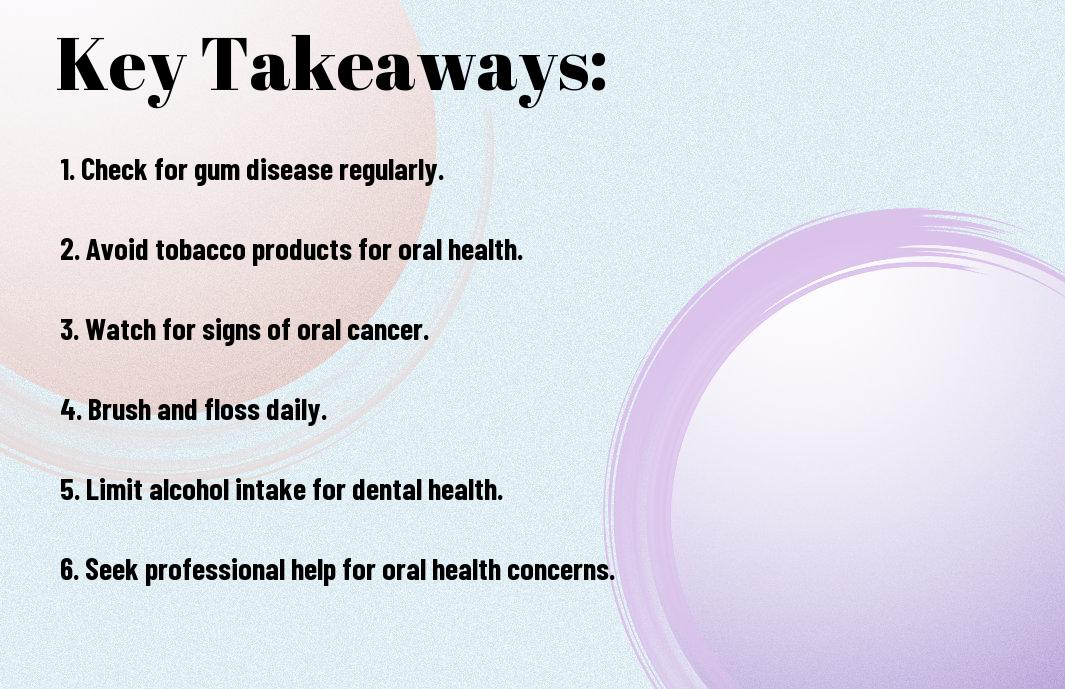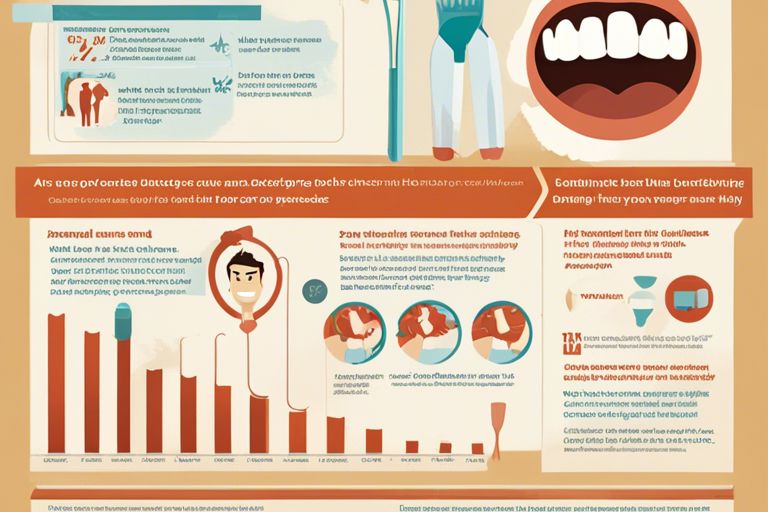Most men face unique challenges when it comes to oral health, often due to lifestyle factors and genetic predispositions. From a higher likelihood of gum disease to increased risk of oral cancer, there are several dangers that men need to be aware of. However, with the right preventive measures and good oral hygiene practices, men can avoid these issues and maintain optimal oral health. In this blog post, we will explore the important factors that impact men’s oral health and provide key strategies for keeping their mouths healthy and happy.
Key Takeaways:
- Hormonal changes: Men may experience hormonal changes which can affect oral health, leading to issues such as gum disease and dry mouth. Regular dental check-ups can help catch these issues early.
- Oral hygiene: Men should prioritize the basics of oral hygiene such as brushing twice a day, flossing, and using mouthwash to prevent cavities, gum disease, and bad breath.
- Diet and lifestyle: Maintaining a healthy diet and lifestyle can positively impact men’s oral health. Avoiding tobacco products and limiting sugary foods and drinks can help prevent oral health problems in the long run.
Unique Challenges in Men’s Oral Health
There’s no denying that men face unique challenges when it comes to oral health. From biological factors to lifestyle choices, there are several aspects that influence male oral health and require attention.
Biological Factors Influencing Male Oral Health
Challenges in men’s oral health can be attributed to biological factors such as hormonal differences, genetic predispositions, and even anatomical variations. For example, men are more likely to experience gum disease due to higher levels of testosterone, which can lead to increased inflammation and bone loss around the teeth. Men also have a higher risk of developing oral cancer compared to women.
- Hormonal differences
- Genetic predispositions
- Anatomical variations
Any delay in seeking treatment for these issues can result in more severe consequences in men’s oral health.
Lifestyle Choices and Their Impact on Oral Health
Oral health in men is further complicated by lifestyle choices such as smoking, excessive alcohol consumption, and poor dietary habits. These behaviors not only increase the risk of oral diseases but also have a negative impact on overall health. Smoking is a major risk factor for periodontal disease and oral cancer, while heavy drinking can lead to dehydration, which affects saliva production and oral hygiene.
The choices men make regarding their lifestyle habits play a significant role in their oral health. It is important for men to be aware of the risks associated with these behaviors and take proactive steps to maintain good oral hygiene for overall well-being.
Common Oral Health Conditions in Men
For Oral health, maintaining good oral hygiene is crucial for overall well-being. Men face unique challenges when it comes to oral health, making it crucial to address common oral health conditions that affect them.
Periodontal Disease and Men
To start, men are more prone to periodontal disease, a condition that affects the gums and supporting structures of the teeth. Factors such as hormonal differences, smoking, and overall systemic health can contribute to the increased prevalence of periodontal disease in men. Additionally, men tend to be less proactive in seeking dental care, leading to undiagnosed and untreated periodontal issues.
Oral Cancer: Prevalence and Risk Factors in Men
One of the most concerning oral health conditions for men is oral cancer. The prevalence of oral cancer is higher in men, with risk factors including tobacco use, heavy alcohol consumption, and exposure to human papillomavirus (HPV). Early detection and regular screenings are crucial in improving outcomes for individuals at risk of developing oral cancer.
- Oral cancer is often asymptomatic in the early stages, making regular dental check-ups crucial for early detection.
- Individuals with a history of smoking or heavy alcohol consumption should undergo regular screenings for oral cancer.
- Assume that any persistent oral sores or lesions should be evaluated by a dental professional to rule out the possibility of oral cancer.
Preventive Measures and Best Practices
Daily Oral Hygiene for Men
The key to maintaining good oral health for men lies in their daily oral hygiene routine. Consistent and thorough brushing and flossing are necessary to prevent issues such as gum disease, cavities, and bad breath. Men should brush their teeth at least twice a day with a fluoride toothpaste and floss daily to remove plaque and food particles that can lead to decay.
Using an antibacterial mouthwash can also help in reducing bacteria in the mouth, promoting healthier gums, and fresher breath. Men should be mindful of their diet as well, as consuming sugary and acidic foods and beverages can contribute to tooth decay. Incorporating a balanced diet rich in vitamins and minerals is beneficial for both oral and overall health.
Professional Dental Care and Regular Check-ups
Oral health is not only about daily self-care but also about seeking professional dental care and regular check-ups. Visiting the dentist at least twice a year for cleanings and exams is crucial in maintaining oral health. Dentists can detect early signs of issues such as gum disease, cavities, and oral cancer, providing timely treatment and preventive measures.
It is recommended to schedule routine dental check-ups to ensure any potential problems are addressed promptly. Professional cleanings can remove stubborn plaque and tartar buildup that regular brushing and flossing may miss, helping to prevent gum disease and other oral health issues.
Advancements in Men’s Oral Health Care
To maintain optimal oral health, men must stay up-to-date with the latest advancements in dental care. Technology and research have significantly improved the way oral health issues are diagnosed, treated, and prevented. These advancements have led to a more effective and efficient approach to men’s oral health care.
Innovative Dental Treatments and Technologies
Health professionals now have access to a wide range of innovative dental treatments and technologies that can address various oral health problems in men. From laser dentistry for precise treatment to 3D imaging for accurate diagnosis, these advancements have revolutionized the field of dentistry. Moreover, advancements in materials used for dental restorations have made treatments more durable and natural-looking, enhancing the overall aesthetic appeal of dental work.
The Role of Nutrition and Supplements in Oral Health
To maintain optimal oral health, men need to pay attention to their diet and consider incorporating supplements that are beneficial for their teeth and gums. Key nutrients like calcium, vitamin D, and vitamin C play a crucial role in maintaining strong teeth and healthy gums. Incorporating these nutrients into one’s diet can help prevent common oral health issues such as gum disease and tooth decay.
A well-balanced diet that includes a variety of fruits, vegetables, and dairy products can provide imperative nutrients for oral health. Additionally, men can consider taking supplements like calcium and vitamin D if their diet lacks these nutrients. Consulting with a healthcare professional or a dentist can help determine the right supplements to include in one’s daily routine for optimal oral health.
Summing up
Men’s oral health presents unique challenges that can impact their overall well-being if not addressed properly. From higher rates of gum disease to increased risk of oral cancer, men must be proactive in their preventive measures. By maintaining a good oral hygiene routine, visiting the dentist regularly, avoiding tobacco and excessive alcohol consumption, and paying attention to their diet, men can significantly reduce their risk of oral health issues. It is crucial for men to prioritize their oral health to maintain a healthy smile and prevent potential complications in the future.
FAQ
Q: What unique challenges do men face regarding oral health?
A: Men face unique challenges in oral health due to higher rates of gum disease, tooth loss, and oral cancer compared to women. Factors such as differences in hormones, genetics, and lifestyle choices contribute to these challenges.
Q: How can men prevent oral health issues?
A: Men can prevent oral health issues by practicing good oral hygiene habits such as brushing and flossing regularly, having routine dental check-ups, avoiding tobacco products, limiting alcohol consumption, and consuming a healthy diet low in sugar and acidic foods.
Q: What are some preventive measures specifically tailored for men’s oral health?
A: Men can take preventive measures such as using oral care products designed for men that address their specific needs, being aware of the signs of oral health problems like gum disease or oral cancer, and seeking prompt treatment if any issues arise. Additionally, incorporating a mouthwash with fluoride into their daily routine can help strengthen enamel and prevent decay.







